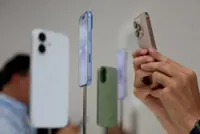This major breakthrough in miniaturised bio-batteries was developed by researchers at the Shenzhen Institutes of Advanced Technology (SIAT) of the Chinese Academy of Sciences and Shenzhen University. — AFP Relaxnews
Researchers in China have developed a completely new form of bio-battery based on bacteria, capable of generating its own electricity and recharging itself for several cycles.
This major breakthrough in miniaturised bio-batteries was developed by researchers at the Shenzhen Institutes of Advanced Technology (SIAT) of the Chinese Academy of Sciences and Shenzhen University. Their research is published in the journal Advanced Materials.
This innovative bio-battery uses electroactive bacteria encapsulated in an alginate-based hydrogel to generate electricity. These living hydrogels are 3D-printed and can therefore be customized. For the moment, it's a very small device (20 mm in diameter and 3.2 mm high), but it works. Thanks to the bacteria's metabolism, the bio-battery can recharge itself for up to 10 cycles without any external energy input.
The battery stands out for its sustainability and low environmental impact, using no critical raw materials like cobalt or lithium, or toxic components such as organic electrolytes. In fact, it is ideally suited to potential applications in medical devices, such as implants.
Researchers have demonstrated, for example, that this bio-battery could be used for sciatic and vagus nerve stimulation, enabling very precise control of bioelectric stimulation and blood pressure signals. This approach could pave the way for innovative physical therapies, even if they are still currently a long way off. – AFP Relaxnews





